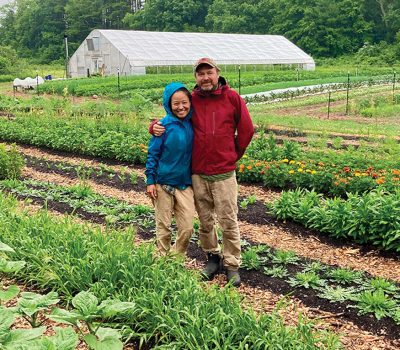Production Agriculture
Supporting Connecticut Agriculture and Farmers

Connecticut agriculture is integral in providing products that offer food security and environmental benefits. UConn Extension offers in-person and virtual programs for vegetable, fruit, greenhouse, nursery and landscape, dairy, turfgrass, livestock, aquaculture, and specialty crops, among others. We develop programming and resources based on needs assessments from the respective groups. Here are a few examples of that work.
Many farmers had climate-related challenges in 2023. A deep freeze in February and late May frost damaged fruit and other crops statewide, causing $8.4 million in losses. Evan Lentz, extension educator in fruit crops, worked with the Connecticut Commissioner of Agriculture Bryan Hurlburt on an agricultural disaster declaration at the end of May to open the availability of low-interest U.S. Department of Agriculture Farm Service Agency emergency loans for eligible producers.
Vegetable producers were particularly hard hit by flooding in July with an estimated $21 million in damage and lost crops. Shuresh Ghimire, extension educator in vegetable crops, noted that the extreme weather timing was especially detrimental, and is working with farmers to prevent and mitigate future losses. “As weather-related disasters are increasingly impacting farmers lately, more have adopted climate-adaptation strategies to minimize the negative impact,” he says. For example, his work with plastic mulch and raised beds is helping moderate soil moisture and avoid water-logging conditions in the root zone.
Farmers of color often lack opportunities and face barriers to institutional knowledge typically available to white farmers. Approximately 96% of U.S. farmers are white. Therefore, new and beginning farmer support includes the Leaders of Color in Conservation training program that provided professional development for people of color to serve as leaders in conservation for their communities. “Our overall goal was to support farmers of color in our state by connecting them with state and federal expertise and funding to help conserve their natural resources. To do this, we trained eight people of color to serve as front-line technical advisors who were then able to directly reach 14 historically underserved farmers,” says Jiff Martin, extension educator in sustainable food systems.
Martin partnered with E&G Community Builders, led by Elizabeth Guerra and Héctor “Freedom” Gerardo, to co-lead the Leaders of Color in Conservation grant from the USDA Natural Resources Conservation Service Conservation Innovation Grants Program. Many of the participants were also farmers themselves.
Extension programs continue strengthening and supporting agriculture and farmers in Connecticut. Efforts are ongoing as we work collaboratively with farmers to ensure a vibrant and sustainable agricultural industry and food supply for consumers.
New and Beginning Farmers
The Leaders of Color in Conservation (LOCC) training program is coordinated by UConn Extension and partners to help leaders with knowledge and resources to serve their communities. Learn more at s.uconn.edu/leading.